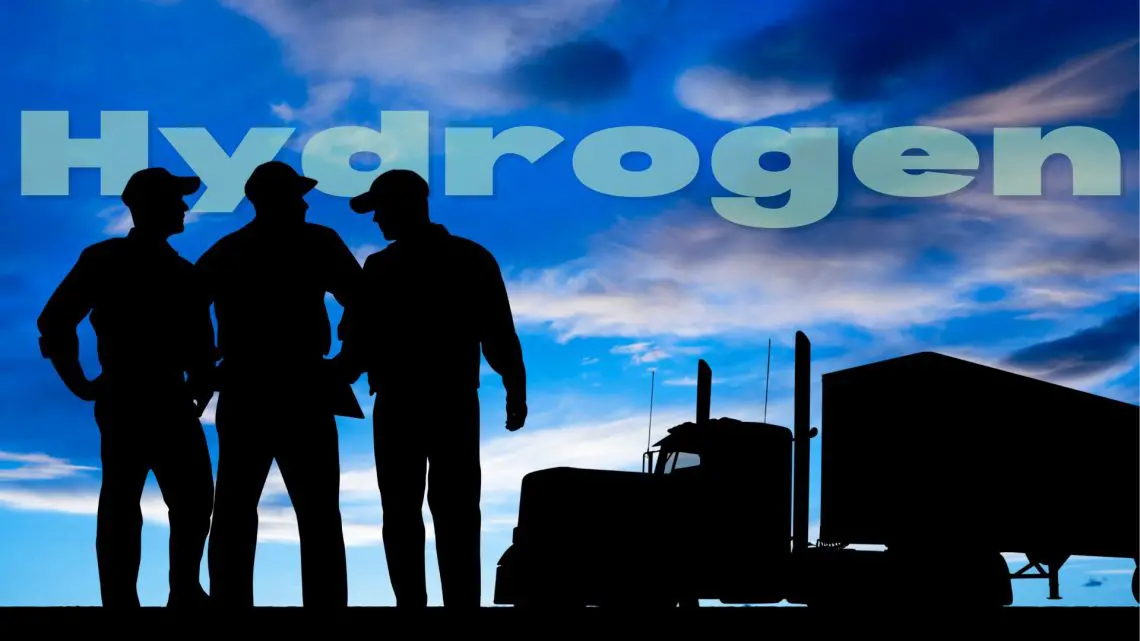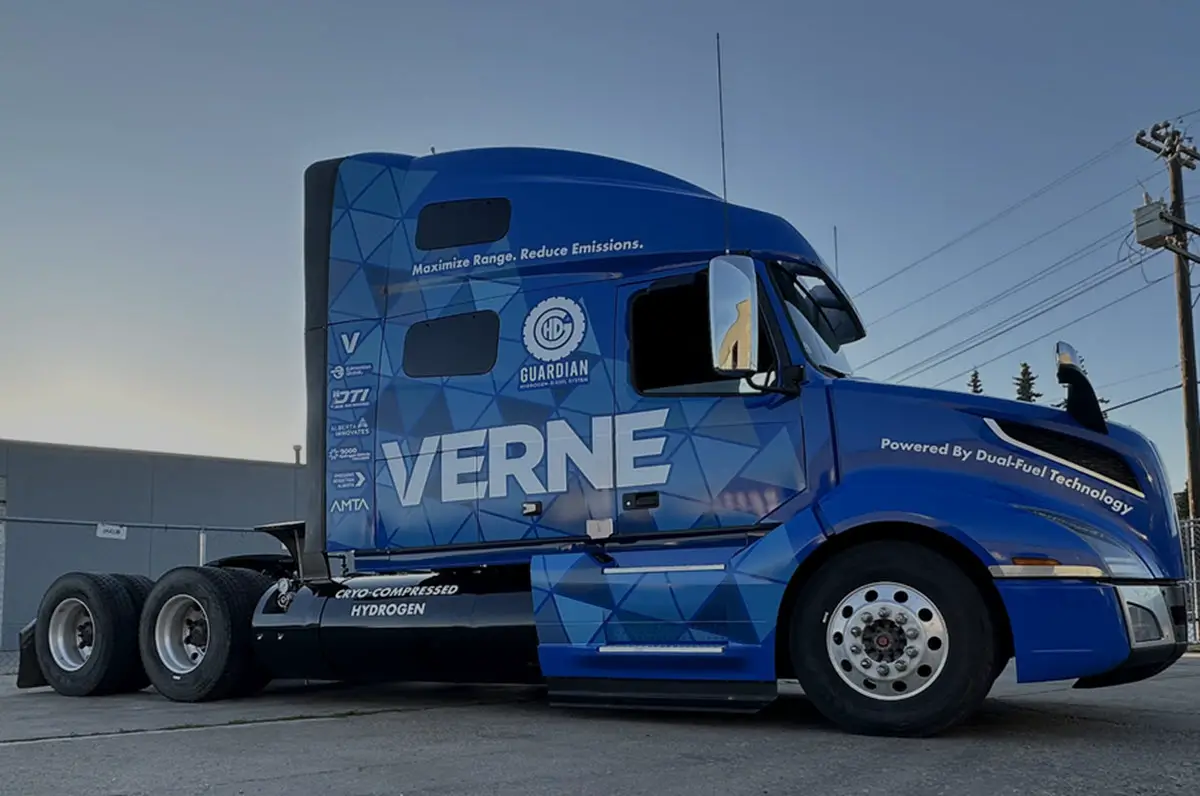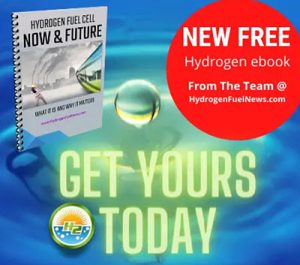
A New Era in Hydrogen Trucking: Verne’s Cryo-Compressed Breakthrough
October 4, 2024Verne and its industry partners have hit a significant milestone with the completion of the first heavy-duty Class 8 truck powered by cryo-compressed hydrogen (CcH2). This innovative Hydrogen truck, showcased at the Alberta Motor Transport Association Innovation Expo in Edmonton, offers a glimpse into the future of sustainable heavy-duty transportation. Attendees had the opportunity to inspect the truck, which is set to undergo drive testing soon as part of multiple commercial pilot programs.
Understanding Cryo-Compressed Hydrogen
Cryo-compressed hydrogen involves cooling and compressing hydrogen to achieve maximum storage density. This advanced method markedly surpasses traditional liquid hydrogen storage, boosting hydrogen density by 33% and achieving an impressive 87% improvement over standard 700-bar compressed gas systems. Such gains enable Verne’s CcH2 technology to store more hydrogen within any given volume, thereby extending the vehicle range to match diesel alternatives without sacrificing payload or efficiency.
Fleet Benefits: Range, Payload, and Cost Efficiency
The hallmark of Verne’s CcH2 technology is its superior hydrogen storage system, which maximizes storage density to 73 g/L. This is a remarkable 33% improvement over liquid hydrogen and an 87% enhancement compared to traditional 700 bar compressed gas hydrogen.
-
Verne’s cryo-compressed hydrogen (CcH2) technology significantly enhances storage efficiency, resulting in:
- Increased vehicle range, allowing for extended travel distances without refueling.
- Reduced overall weight of the storage system, contributing to better vehicle performance and fuel efficiency.
- Lowered storage system costs, making the technology economically viable for adoption.
-
The technology achieves diesel-parity in terms of range and payload, a critical requirement for heavy-duty truck fleets that contribute to 12% of global CO2 emissions.
-
A key innovation is the integration of Diesel Tech Industries’ Guardian Hydrogen Diesel System, which:
- Enables traditional diesel engines to run on a blend of diesel and hydrogen.
- Acts as a crucial transitional technology for the trucking industry, offering a practical solution for fleets to experiment with hydrogen without needing to replace their entire fleet.
-
Verne is set to showcase the advanced range and payload capabilities of their high-density CcH2 fuel through:
- Collaborations with leading vehicle manufacturers and fleet operators in Canada and the United States.
- Demonstrations that will highlight the versatile application and benefits of CcH2 technology in reducing emissions and improving efficiency in heavy-duty transportation.
Previously, Verne set a record for CcH2 storage with a 29 kg system demonstration at Lawrence Livermore National Laboratory and successfully tested a fuel cell electric vehicle powered by CcH2. The company is also pioneering hydrogen densification and distribution techniques, aiming to reduce hydrogen delivery costs by close to half, thus accelerating hydrogen adoption in sectors reliant on diesel, including heavy-duty trucks and off-road equipment.
More About Verne
Verne’s Edge with Dual-Fuel and Hydrogen Technologies
Verne’s integration of dual-fuel engines, hydrogen combustion engines, and hydrogen fuel cells reflects its commitment to versatile and sustainable solutions. This approach not only facilitates a smoother transition for existing fleets but also maximizes the potential for hydrogen adoption across various applications. By addressing the core needs of range, payload, and cost-effectiveness, Verne positions itself as a front runner in the hydrogen-powered transport market.

Hydrogen Truck Image Credit Verne
Positioning Against Industry Giants
Verne is positioning itself as a formidable competitor to industry giants like Volvo and Nikola by leveraging its advanced cryo-compressed hydrogen (CcH2) technology. This technology enables Verne to achieve diesel-parity in range and payload, addressing the critical needs of heavy-duty truck fleets. By focusing on maximizing hydrogen storage density and cutting distribution costs by up to 40%, Verne offers a highly efficient and cost-effective solution.
Their strategy includes strategic collaborations with key manufacturers and fleet operators, which not only enhances their market presence but also highlights the tangible benefits and practicality of their innovative technology in the hydrogen-powered heavy-duty truck sector.
Comparing Hydrogen Truck Technologies: Cummins, Verne, Volvo, and Nikola
Cummins X15H Hydrogen Internal Combustion Engine
- Power Ratings: 298-395 kW (400-530 hp)
- Peak Torque: 2600 Nm
- Emissions Reduction: Hydrogen-powered, emitting 99% less carbon than diesel counterparts
- Integration: Similar to current diesel and natural gas engines, facilitating ease of adoption
- Operating Range: Comparable to current diesel engines, suitable for heavy-duty or long-range applications
- Hydrogen Fuel Delivery: High-capacity 700 bar system with Type IV on-vehicle storage vessels
- Potential Range: Over 1,000 kilometers with the hydrogen fuel system
Verne Cryo-Compressed Hydrogen Truck
- Hydrogen Density: 73 g/L, offering a 33% improvement over liquid hydrogen and an 87% improvement over traditional 700 bar compressed gas hydrogen
- Range and Payload: Achieves diesel-parity range and payload, critical for heavy-duty vehicles
- Emissions: Zero-emission capabilities, addressing 12% of global CO2 emissions from heavy-duty transportation
- Integration: Uses Guardian Hydrogen Diesel System, allowing a retrofit of traditional diesel engines for dual-fuel capability
- Cost Efficiency: Potential to reduce hydrogen delivery costs by up to 40%, enhancing economic viability
Volvo Hydrogen Combustion Engine with HPDI Technology
- Fuel System: High Pressure Direct Injection (HPDI) technology using a small amount of diesel for ignition
- Efficiency and Performance: Offers up to 10% improved thermal efficiency and 20% more power and torque compared to base diesel engines
- Emissions Reduction: Reduces CO2 emissions by 95% compared to a base diesel engine
- Operating Range: Approximately 800 km with 80 kg hydrogen storage capacity
- Market Readiness: Customer tests planned before full roll-out, aligning with global hydrogen infrastructure development
Nikola Tre FCEV
- Range: Up to 500 miles
- Power: 536 horsepower (400 kW) continuous, 773 horsepower (575 kW) instantaneous
- Fuel Cell Power Module: 200 kW
- Hydrogen Storage Capacity: 70 kg
- Refueling Time: Less than 20 minutes
- Specifications: Wheelbase of 182 inches, exterior width of 103.6 inches, interior height of 80.6 inches
- Gross Combined Weight: 82,000 lbs
This comprehensive comparison highlights the array of technological advancements and strategic approaches within the hydrogen-powered heavy-duty truck sector. Each company presents unique features tailored to meet diverse operational requirements, including power, range, and system integration. This variety reflects the market’s dynamic nature and the potential impact of these innovations on the future of sustainable transportation. Notably, a significant distinction lies in which companies are currently offering their technologies for sale, indicating their readiness to meet the immediate demands of the industry, this being Nikola.
A Step Towards Industry-Wide Decarbonization
The debut of Verne’s cryo-compressed hydrogen truck at the Alberta Motor Transport Association Innovation Expo highlights its commercial readiness. Collaborations with leading manufacturers and operators in Canada and the United States for pilot programs signal a shift towards setting new standards in sustainable transportation.
Beyond individual operations, Verne’s technology holds the potential to significantly lower the heavy-duty transportation sector’s CO2 emissions, which currently account for 12% of global emissions. By achieving diesel-parity in range and payload, Verne takes a crucial step towards large-scale decarbonization goals.
As the global focus shifts to sustainable solutions, Verne’s cryo-compressed hydrogen technology emerges as a promising contender in the race for cleaner transportation. By effectively addressing fleet owners’ challenges—maximizing range and payload while reducing weight and cost—Verne is poised to capture a significant market share and drive the industry towards a sustainable future.



 With over 15 years of reporting hydrogen news, we are your premier source for the latest updates and insights in hydrogen and renewable energy.
With over 15 years of reporting hydrogen news, we are your premier source for the latest updates and insights in hydrogen and renewable energy.